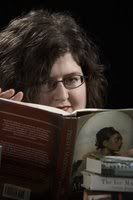 “This book is about life as it is interpreted by books. Each of the chapters has a double subject: on the one hand, an English novel written in the nineteenth or twentieth century, and on the other, one of the great experiences or stages that occur, or can occur, in more or less everyone’s life.”
“This book is about life as it is interpreted by books. Each of the chapters has a double subject: on the one hand, an English novel written in the nineteenth or twentieth century, and on the other, one of the great experiences or stages that occur, or can occur, in more or less everyone’s life.” These opening lines of Edward Mendelson’s work of literary criticism - The Things That Matter - encapsulate his intent. A study of seven classical novels by Mary Shelley, Emily and Charlotte Brontë, George Eliot and Virginia Woolf, Mendelson’s essays present his thesis that novels provide insight into specific stages of life and, these novels, when viewed collectively present a “history of the emotional and moral life of the past two centuries.”
Mendelson has aimed his work at readers of any age, the only prerequisite being knowledge of the seven novels. He writes in a conversational manner, as if lecturing directly to the reader. Theories and supporting arguments are presented within the text, footnotes included only when critical. Woven throughout is information about the prevailing theories and literary themes of the period.
In the section on Wuthering Heights Mendelson explores Brontë’s idea of romantic childhood, tracing its roots to the romanticism of Wordsworth and Freud. His Wuthering Heights is a very different one than the one commonly studied in high school. Heathcliff and Catherine are desperate to recapture the total unity experienced as children, to merge two selves into one. Whereas the commonly held perception is of a novel of thwarted passion and cruelty, Mendelson believes Brontë deliberately led readers to this conclusion and away from her true meaning. “She disguised Wuthering Heights as a story of doomed sexual passion perhaps because she regarded her potential readers with something close to contempt…they could not understand what this book tells them.”
Each of the authors is examined with the same focus, each essay meriting its own review. Mendelson states that he “could easily imagine a similar book to this one made up of entirely different examples.” I’ll keep my fingers crossed that inspiration strikes and Mendelson shares more of his thoughts on life and literature.
Read the review at Armchair Interviews.
ISBN10: 0307275221
ISBN13: 9780307275226
Trade Paperback
264 Pages
Publisher: Anchor Books
Publication Date: November 6, 2007
tags: books book reviews Edward Mendelson literary criticism Mary Shelley George Eliot Emily Brontë Charlotte Brontë Virginia Woolf


No comments:
Post a Comment